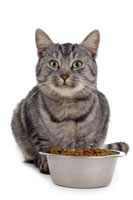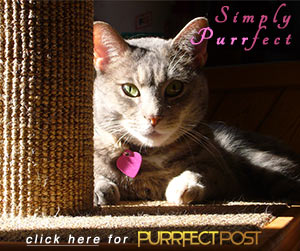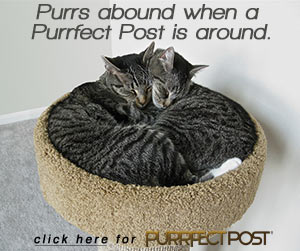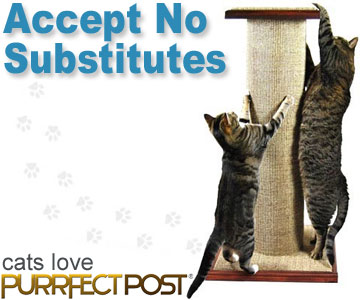Wet Food vs. Dry Food For Cats

It's a common question heard by veterinarians: should I give my cat wet or dry food? Here, we explore some of the reasons for giving each type of cat food.
Wet Food is a Natural Source of Water, a Critical Nutrient
Wet (canned) food is beneficial for cats because it provides moisture. Cats in the wild get most of their water from the prey they consume, with little or no need for drinking it on the side. In fact, cats have evolved with a very low thirst drive as compared with other species. When eating an all-dry diet, their water intake easily falls short of their actual needs, allowing them to become dehydrated and more prone to kidney disease and urinary tract problems.
Here is some more information about wet cat food and water content:
- Wet food is about 75 percent water, which is roughly equal to the percentage of water in cats’ prey in the wild. Dry food is only about ten percent water.
- The average cat who eats only dry food needs to drink several ounces of water a day to make up for the lack of water from food.
- Studies show that cats fed solely dry food have a lower water intake and lower urine volume than cats on a wet food diet, even if they have constant access to fresh water.1,2
- Studies also suggest that, regardless of cats' total food and water consumption, the proportion of water in the diet is higher for cats fed wet food than for cats fed dry food.3
- Some veterinarians warn that insufficient moisture in the diet may increase the risk of crystals or stones in the urinary tract. An ample volume of urine is necessary to dilute solid materials that could otherwise accumulate and form stones. Stones can cause painful, sometimes even life-threatening, urinary tract blockages.
- A recent study showed that switching from dry to wet food decreased the incidence of cystitis, or inflammation of the bladder, in cats.4 Make sure your cat has fresh, clean water every day. If your cat eats predominantly dry food, you may want to invest in a pet water fountain to encourage more water consumption.
Research on Whether Dry Food Improves Cats’ Dental Health Is Inconclusive
Dental health is a big reason why cats are fed dry food. Here is some information on dental health and cats' diets.
- Some studies show a small dental benefit when hard food is included in cats’ diets; others do not.5 One reason hard food may have a limited impact on cats’ teeth and gums is that cats aren’t big chewers, so the hard food they eat has little opportunity to do abrasive cleaning.
- Some veterinarians express concern that the higher carbohydrate content and starchy coating of many hard foods could actually contribute to plaque formation.
- Specially formulated dental diets do seem to benefit cats’ dental health, perhaps because the larger sized kibble forces more chewing.
- For a listing of diets scientifically proven to improve cats' oral health, visit the Veterinary Oral Health Council .
- By far, the best things you can do for cat's teeth and gums are frequent brushings and regular veterinary dental exams and professional cleanings as prescribed. Learn more here: "Home Dental Care for Cats."
Dry Food May Contain Too High a Percentage of Carbohydrates
Cats’ natural carnivorous diet includes only a small percentage of carbohydrates (as little as 3-5 percent), mostly in the form of digested plant matter in the stomachs of prey. However, most dry foods contain several times that amount. Cats use dietary protein and fats as their primary energy source. They are poor at metabolizing carbohydrates. Excess carbs get converted into body fat and promote a sugar/insulin imbalance. This, in turn, sets the stage for obesity and raises the risk for diabetes.
Dry Food Is Far More Convenient than Wet Food
For convenience, hard food beats wet food paws down, which is why most people with cats include hard food in their cats’ diets. For instance, when you leave the house for a while, it makes sense to leave out hard food, not wet food, which will spoil and become unappetizing (and messy to clean).
A Common Resolution to “Wet or Dry?” is “Both”
A balance between the essential moisture provided by wet food and the convenience of dry food may result, for example, in a routine where you give your kitty wet food twice a day and leave out a sufficient amount of hard food for in-between times.
Making the Transition
Your veterinarian may have prescribed a certain formulation because of health problems such as dental or urinary tract disease. Or perhaps you just wish to expand your kitty’s culinary horizons. Consider trying these approaches when making a diet change:
- Introduce new foods gradually. If your cat appears to be stressed due to a change in diet, you may need to slow down the pace of the change. Stress can counteract any positive effects of dietary changes.
- If your cat’s diet consists solely of free-feeding on dry food and you want to transition to a wet food diet, incrementally reduce free-feeding amounts so that your kitty periodically empties the food bowl. Before refilling the bowl and when your cat seems hungry, offer wet food.
- If your cat eschews wet food, try warming it, especially if it's been refrigerated, to a tepid temperature. Stir it a couple of times and make sure there are no hot spots, which can occur when food is microwaved, before serving.
- Crumble a treat and sprinkle it over the new food. Or try tuna juice.
- Some cats don’t like their wet food and dry food to be intermingled.
- Some cats are more receptive to a new food if it’s in a separate bowl adjacent to their present food.
Always Consult Your Veterinarian
Your cat’s diet and nutrition are an important aspect of his or her general health and are part of a complete annual wellness exam. For the best advice on feeding your feline, be sure to consult your veterinarian.
Resources:
- 1. Gaskell C. J. The role of fluid in the feline urological syndrome. In: Burger IH, Rivers JPW, eds. Nutrition of the Dog and Cat. Cambridge, UK: Cambridge University Press, 1989; 353-356. "http://grande.nal.usda.gov/ibids/index.php?mode2=detail&origin=ibids_references&therow=426490
- 2. Gaskell, C. J. (1985) Feline urological syndrome: a United Kingdom perspective. Feline Medicine: Proc. Seminar Eastern States Veterinary Conference, Orlando, pp. 27-32. Veterinary Learning Systems, NJ.
- 3. Nutrient Requirements of Cats, Revised Edition, 1986, Committee on Animal Nutrition, National Research Council http://www.nap.edu/catalog.php?record_id=910
- 4. Markwell PJ, Buffington CA, Chew DJ, Kendall MS, Harte JG, DiBartola SP. Clinical evaluation of commercially available urinary acidification diets in the management of idiopathic cystitis in cats. J Am Vet Med Assoc. 1999 Feb 1;214(3):361-5. http://www.ncbi.nlm.nih.gov/pubmed/10023397
- 5. Logan, et al., Dental Disease, in: Hand et al., eds., Small Animal Clinical Nutrition, Fourth Edition. Topeka, KS: Mark Morris Institute, 2000, p. 487 http://www.amazon.com/Small-Animal-Clinical-Nutrition-Michael/dp/0945837054
You May Also Like These Articles:
Dehydration in Cats: How Can You Tell If a Cat Is Dehydrated?
Should You Get Your Cat a Water Fountain?
Should Cats Get Tap or Filtered Water?
Giving Your Cat Clean and Fresh Water
Does Your Cat Have Whisker Fatigue?




